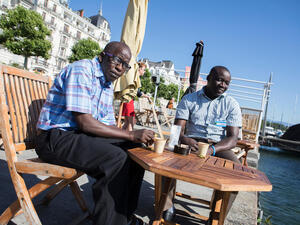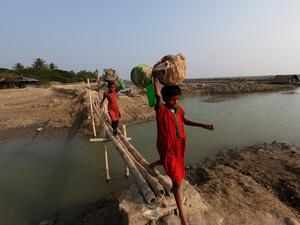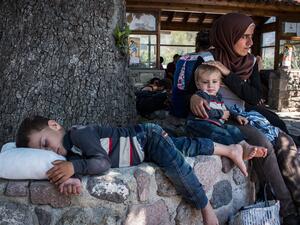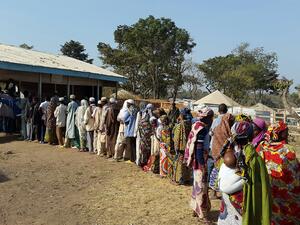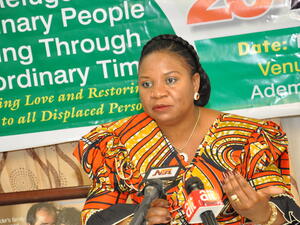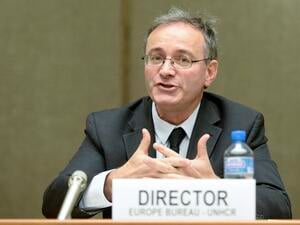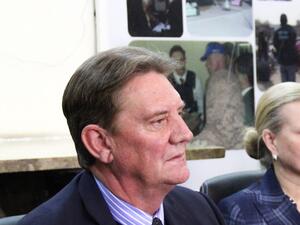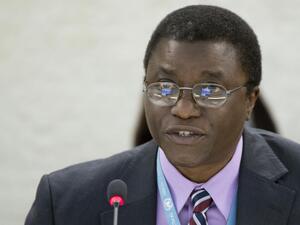Q&A: Opening as many doors as possible for long-term refugees
Q&A: Opening as many doors as possible for long-term refugees

Janet Lim, Director, UNHCR Asia Bureau.
GENEVA, June 1 (UNHCR) - Singaporean Janet Lim has built up a broad spectrum of experience during her 26 years with UNHCR. Today, she heads the agency's Asia Bureau and has responsibility for an area ranging from the Persian Gulf to the South Pacific. There are some 5.82 million people of concern to UNHCR in this area, including 4.1 million refugees and asylum seekers. Many are caught in protracted refugee situations - of the 1.48 million people in Asia's refugee camps, most have been there for more than 15 years. Lim discussed these protracted refugee situations earlier this week with Web Editors Leo Dobbs and Haude Morel. Excerpts from the interview:
Much of the Asia Bureau's time is taken up in dealing with protracted refugee situations. Please tell us something about them.
I have made the protracted refugee situations one of the priorities in the region.... One is the [ethnic] Karen refugee camp situation in Thailand. [A large-scale resettlement programme is now under way for the Karens from Myanmar] We also have the protracted situation of the refugees in Nepal who have come from Bhutan. We also have the protracted situation in Bangladesh. That particular situation seems like a very small one. It's about 20,000 people; the remnants of what used to be a very large population of Rohingyas from Myanmar, most of whom have returned.
And, of course, we have the protracted situation of the Afghan population in the region. There are also protracted situations in urban centres. Often when you look at protracted situations, you think camp situations. They're more visible, you can see that the camps are still there after 15,16 years. These protracted situations are all about one or two decades.
If you sit back and think about it, you are talking about whole generations growing up in the camps.... If we don't deal with the protracted situation, we are investing in problems in the future, particularly in the kind of world we live in today. In camps where you have young people, you can see that they get very frustrated, very restless - they don't have a normal life. You might get the minimum essential needs met, but your life is essentially wasted. Education is limited.... There is an extreme urgency to find solutions for these protracted situations in Asia.
We are seeing large-scale resettlement of the Karens. What about the protracted refugee situation in Nepal, which you visited recently with High Commissioner António Guterres?
It has been a very good process for refugees in the camps in Nepal, with a core group of countries engaged in trying to help find solutions. The key to the solutions is, of course, if these countries offer resettlement. The United States has offered a very substantial number - 60,000 or more - while other countries among the core group have indicated interest.
This is the first time that there has been such a breakthrough. Until then, the idea was that the two countries [Nepal and Bhutan] wanted to resolve the situation bilaterally. They have had 15 or 16 rounds of discussion over the last 15 years on how to resolve the problem, which would essentially mean either they go home or they stay in Nepal.
Now, another solution has been made possible by the international community. This really is a window of opportunity. What this means is that the international community is taking most of the burden. If they go through with this offer of resettlement - and if the refugees are willing to accept - then the burden of solutions for the country of return and the host country will be much, much smaller.
What options do you have in trying to find solutions for refugees in these protracted situations?
I think that our approach to finding solutions has to be very flexible and creative. We often have this mantra of saying we have three solutions: resettlement, local integration, voluntary repatriation. We try to promote repatriation as much as possible because that's the best of all solutions. But that is subject to conditions in the country of origin being better - and that's outside of our control. Usually, the one that is within our control is resettlement, when countries offer.
And the refugees themselves have their own aspirations. Not everybody will want to go for resettlement. On the other hand, once resettlement starts it does create a certain dynamic in the camps among people who would otherwise think, "Why would I want to go to the United States or Norway or whatever, because there's no Karen there, there's no Rohingyas, there's no Bhutanese."
If that happens, it will often make it easier for the other two solutions to come into play because then the problem is more manageable for the host country and also, in some situations, for the country of return. So we try to be flexible ... and sometimes, if we're too rigid, countries will say we cannot have resettlement without repatriation or without local integration.
The idea of course is to try and solve the problem for everybody, which means we should try to give all refugees as much choice as possible. Unfortunately, sometimes in a camp there are people who want to use the refugees for political purposes and so they will want to try and push for one solution as opposed to another. But I think it is the role of UNHCR to make sure that the refugees have freedom of choice. First of all, we try to open as many doors as possible - hence our advocacy with resettlement countries.
In Asia, we have been quite successful. That's why you have resettlement opening up in Thailand, you have resettlement we hope starting soon in Nepal. And in Bangladesh there has been this large-scale return, but still the remaining group has to be found options. I think it's the responsibility of UNHCR to try and open as many doors as possible. Then you can tell the refugees: "We want to make sure you have the freedom to choose."
What is the human legacy of these protracted refugee situations?
The greatest impact is among some of the young people who have potential but who cannot lead a normal life. Then you have the situation among families. We have evidence that in a closed camp situation the level of violence within the family is often very high.
You have adults with no work to do, they're sitting around. I think SGBV [sexual and gender-based violence], domestic violence, are consequences of the kinds of conditions they have to live under. There are also problems in camps related to power structures. You have groups trying to use their power to subjugate others. It's not a healthy situation at all.
What about urban refugees caught in protracted situations?
It is very important to focus on them because you're talking about individuals. Often in an urban situation, they are protracted because you cannot find them solutions. In an urban situation, the solution is often resettlement. If they're not resettled it's because they don't qualify under the rules of certain resettlement countries and they keep being rejected by one country after another.
It's okay if it's just one or two years. But if it's five years, six years and more, you really see the mental stress of these individuals. I've seen cases where they contemplate suicide; they're in a society that is very foreign to them. We keep pushing them for one country after another. In the end, we have to urge the resettlement country: "Don't focus on whether or not they qualify under your resettlement criteria, but look at them from the humanitarian point of view."
You have to have a new way of looking at it. In the camps, you think of a big population - but here, you see the individual, you see the children. I've spoken to Iraqi refugees who are stuck in some of our capital cities in Asia where the parents cannot work, the children cannot go to school - they become mental cases.
These urban refugees are everywhere that we have refugees. In all the countries where we are present, these individual cases come to us. We have to review their cases, see whether they qualify for [refugee] status. If they do, then we have to start assisting them and then we try to find solutions for them. So it has consequences not only for the individuals, but also for UNHCR as an organization. It's extremely expensive to assist these individual cases. Very often the countries do not want to pay anything at all. "They're your responsibility," they say to UNHCR.
Are donors getting fed up with funding never-ending situations?
There's always a danger that over time the donors will say, "We can't just keep pumping money in." And not only that. You're not pumping money in to give a positive solution, you're pumping money in to keep people in a restrictive situation. So, yes, from the point of view of investment, it's not a very good idea.... The camps should always be a last resort and, as soon as we can, we should try and find other options.
What is the way forward?
In any refugee situation, whether it is a camp or urban setting.... You simply have to find solutions for these people. I think it's very important for us not to give up. It's very easy to just continue from one day to the next, from one year to the next - getting the budget and continuing to arrange for the delivery of assistance. That's not, in my view, doing our job well. We should not be keeping refugees in a perpetual state of limbo. Our focus should be on trying to get them out of that state of limbo.

